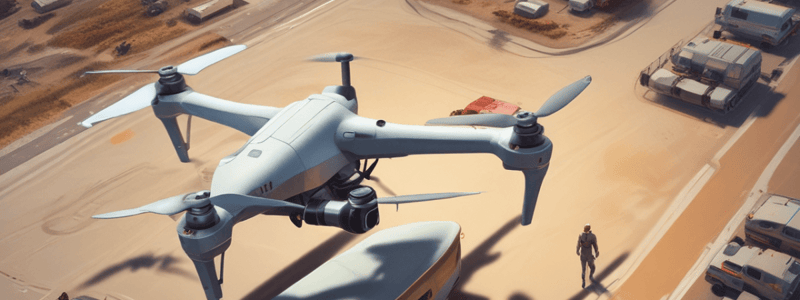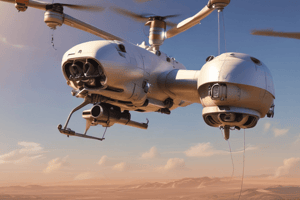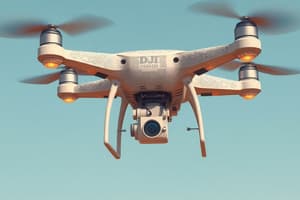Podcast
Questions and Answers
What is the correct procedure to activate the drone?
What is the correct procedure to activate the drone?
- Change to local data only mode before restarting the app
- Put the drone in standard mode and then restart the app (correct)
- Put the drone in sport mode and restart the app
- Activate the drone while it is in maintenance mode
Which of the following should be checked during a pre-flight check?
Which of the following should be checked during a pre-flight check?
- Return to home altitude and battery level (correct)
- User's skill level and flight experience
- Weather conditions and pilot mood
- Drone's color scheme and design
What is the recommended return to home altitude for mapping missions over 300 ft?
What is the recommended return to home altitude for mapping missions over 300 ft?
- 400 ft (correct)
- 200 ft
- 600 ft
- 800 ft
How often should the drone's props be replaced?
How often should the drone's props be replaced?
Which component status is NOT displayed on the safety screen?
Which component status is NOT displayed on the safety screen?
What should be done every 10 hours as part of the regular maintenance schedule?
What should be done every 10 hours as part of the regular maintenance schedule?
What is a recommended action as part of maintaining the drone's performance?
What is a recommended action as part of maintaining the drone's performance?
What should be done after each use to ensure proper maintenance of the drone?
What should be done after each use to ensure proper maintenance of the drone?
The drone should be activated in standard mode before restarting the app.
The drone should be activated in standard mode before restarting the app.
The drone's battery voltage is one of the factors to be checked during the pre-flight inspection.
The drone's battery voltage is one of the factors to be checked during the pre-flight inspection.
The safety screen displays information about the drone's propulsion, avionics, and remote control battery life.
The safety screen displays information about the drone's propulsion, avionics, and remote control battery life.
The maintenance program recommends replacing props every 50 hours or when they show signs of failure, such as bending or tracking higher.
The maintenance program recommends replacing props every 50 hours or when they show signs of failure, such as bending or tracking higher.
The maintenance schedule advises cleaning the drone's cameras and props every 100 hours.
The maintenance schedule advises cleaning the drone's cameras and props every 100 hours.
Study Notes
Connecting to the Internet and Activating the Drone
- To activate the drone, put it in standard mode and then restart the app
- Sign in and go to DJI Pilot 2, top left corner, click the shield, and change to local data only mode
- Restart the app again
Pre-Flight Check
- Check the drone's status: battery level, voltage, RTK, return to home altitude, max altitude, home point, obstacle avoidance, and out-of-control action
- Set return to home altitude to 400 ft for mapping missions over 300 ft
Safety Screen
- Graphical information on the drone's systems: propulsion, avionics, vision positioning system, and remote controller
- Check remote controller's battery life, drone's battery, and payload
Maintenance Program
- Maintenance program shows battery cycles, total flights, and total distance flown
- Schedule maintenance based on flight hours
- Clean cameras, props, and motors regularly
- Check for cracks, buildup, and debris on props
- Replace props every 50 hours or when they show signs of failure (tracking or bending higher)
Maintenance Schedule
- Create a regular maintenance schedule:
- Every 10 hours: check cameras and props
- Every 50 hours: replace props and check for motor spin and debris
- Regularly clean the drone's systems
- Follow a post-briefing operation to clean and maintain the drone after each use
- Set a plan for maintenance protocol to ensure the drone is properly maintained
Connecting to the Internet and Activating the Drone
- To activate the drone, put it in standard mode and restart the app, then sign in to DJI Pilot 2 and switch to local data only mode in the top left corner
- Restart the app again to complete the activation process
Pre-Flight Check
- Perform a pre-flight check to verify the drone's status, including battery level, voltage, RTK, return to home altitude, max altitude, home point, obstacle avoidance, and out-of-control action
- Set the return to home altitude to 400 ft for mapping missions that exceed 300 ft
Safety Screen
- The safety screen provides graphical information on the drone's systems, including propulsion, avionics, vision positioning system, and remote controller
- Monitor the remote controller's battery life, drone's battery, and payload on the safety screen
Maintenance Program
- The maintenance program tracks battery cycles, total flights, and total distance flown to schedule maintenance
- Clean cameras, props, and motors regularly to ensure optimal performance
- Check props for cracks, buildup, and debris, and replace them every 50 hours or when they show signs of failure (tracking or bending higher)
- Schedule maintenance based on flight hours to ensure timely replacements and checks
Maintenance Schedule
- Establish a regular maintenance schedule to ensure the drone is properly maintained, including:
- Every 10 hours: check cameras and props
- Every 50 hours: replace props and check motor spin and debris
- Regular cleaning of the drone's systems
- Post-briefing operation to clean and maintain the drone after each use
- Set a plan for maintenance protocol to stay on schedule
Connecting to the Internet and Activating the Drone
- To activate the drone, put it in standard mode and restart the app, then sign in to DJI Pilot 2 and switch to local data only mode in the top left corner
- Restart the app again to complete the activation process
Pre-Flight Check
- Perform a pre-flight check to verify the drone's status, including battery level, voltage, RTK, return to home altitude, max altitude, home point, obstacle avoidance, and out-of-control action
- Set the return to home altitude to 400 ft for mapping missions that exceed 300 ft
Safety Screen
- The safety screen provides graphical information on the drone's systems, including propulsion, avionics, vision positioning system, and remote controller
- Monitor the remote controller's battery life, drone's battery, and payload on the safety screen
Maintenance Program
- The maintenance program tracks battery cycles, total flights, and total distance flown to schedule maintenance
- Clean cameras, props, and motors regularly to ensure optimal performance
- Check props for cracks, buildup, and debris, and replace them every 50 hours or when they show signs of failure (tracking or bending higher)
- Schedule maintenance based on flight hours to ensure timely replacements and checks
Maintenance Schedule
- Establish a regular maintenance schedule to ensure the drone is properly maintained, including:
- Every 10 hours: check cameras and props
- Every 50 hours: replace props and check motor spin and debris
- Regular cleaning of the drone's systems
- Post-briefing operation to clean and maintain the drone after each use
- Set a plan for maintenance protocol to stay on schedule
Studying That Suits You
Use AI to generate personalized quizzes and flashcards to suit your learning preferences.
Description
Learn how to activate your DJI drone and perform a pre-flight check to ensure a safe and successful mission. Covers setting up local data mode and checking drone status.




